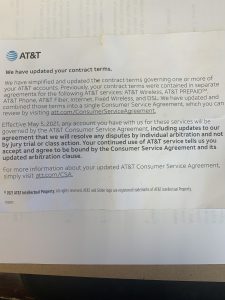 It seems that the issue of forced arbitration clauses in contracts seems to be increasingly in the public conversation, given the debacle of Wells Fargo creating fake accounts by employees to achieve performance bonuses without their customers’s even knowing about it. Unbelievably, Wells Fargo is attempting to rely on forced arbitration clauses in the fake contracts for the fake bank accounts they fraudulently created to avoid being held accountable by a real jury. It’s really hard to believe Wells Fargo’s lawyer would even agree to submit such a position to the court with a straight face and an unburdened conscience. But they are. At least maybe the Wells Fargo fiasco is bringing to light this attempt by many corporations to take away a person’s Constitutional right to a jury trial to resolve a dispute before a dispute even arises and force the aggrieved person to have the dispute heard by a panel of arbiters (often picked by the corporation). They know they stand to fare much better before an arbitration panel than a jury of 12 American citizens, the greatest dispenser of Justice ever conceived by man.
It seems that the issue of forced arbitration clauses in contracts seems to be increasingly in the public conversation, given the debacle of Wells Fargo creating fake accounts by employees to achieve performance bonuses without their customers’s even knowing about it. Unbelievably, Wells Fargo is attempting to rely on forced arbitration clauses in the fake contracts for the fake bank accounts they fraudulently created to avoid being held accountable by a real jury. It’s really hard to believe Wells Fargo’s lawyer would even agree to submit such a position to the court with a straight face and an unburdened conscience. But they are. At least maybe the Wells Fargo fiasco is bringing to light this attempt by many corporations to take away a person’s Constitutional right to a jury trial to resolve a dispute before a dispute even arises and force the aggrieved person to have the dispute heard by a panel of arbiters (often picked by the corporation). They know they stand to fare much better before an arbitration panel than a jury of 12 American citizens, the greatest dispenser of Justice ever conceived by man.
I have written before about the “gotcha” tactics of nursing homes in attempting to steal a resident’s right to a jury trial. I have fought off several attempts on behalf of clients in nursing home malpractice lawsuits. An interesting opinion from the Georgia Court of Appeals recently was issued that deals with an embedded arbitration clause in nursing home admission papers, which, once the resident’s family members sued the nursing home for malpractice in causing the death of their family member, the nursing home asserted to the court as eliminating their right to have a jury hear their case. Gotcha!! This case is Kindred Nursing Centers v. Chrzanowski, 338 Ga.App. 708 (2016) and the facts of the case confirm the nursing home’s attempt at Gotcha! The plaintiff’s mother was admitted on December 4, 2016 to Kindred Nursing Center in Marietta for rehabilitation following surgery for a broken ankle during a fall. Ms. Chrzanowski’s medical records showed she suffered from several chronic medical conditions and also cognitive impairment. According to the appellate record “[i]n the month before her fall, Jeanne went to the emergency room twice within a few days, and reported feeling “loopy” and out of sorts, with some memory loss. The second time she went, she had no recollection of her prior visit just 48 hours earlier. A neurological consult identified an altered mental state, with mild cognitive impairment, depression, and some amnesia. Kindred Nursing Centers Ltd. P’ship v. Chrzanowski, 338 Ga. App. 708, 709, 791 S.E.2d 601, 602 (2016). Two days before Jeanne signed the ADR Agreement, occupational therapy evaluated Jeanne and reported that she was confused, even though she was able to participate in establishing her plan of care. In weekly progress notes from December 5 through December 12, occupational therapy reported that Jeanne was very anxious and confused, commenting to staff, “look at the walls, they are coming out.” In addition, a speech pathologist evaluated Jeanne on December 7 and found that she was severely impaired in understanding yes and no questions; moderately impaired in concentration, understanding sentences, and conversation; and moderately to severely impaired in memory, reasoning, and judgment. That same day, a dietitian performed a nutrition therapy assessment and found Jeanne was very confused and could not remember if she had eaten breakfast. Another assessment determined that Jeanne was at risk for falls due to weakness, medications, confusion, and forgetfulness. Ms. Chrzanowski signed the admission papers on December 7, 2011, which contained the embedded, hidden arbitration clause. On April 25, 2012 Ms. Chrzanowski died in the nursing home after suffering several other falls and hospitalizations. Her family then sued in court for malpractice.
In response to the suit, the nursing home filed a motion with the trial court to enforce the arbitration agreement that was in the admission papers signed by Ms. Chrzanowski while she was obviously suffering from dementia and cognitive impairment. Does that even sound fair to you? I hope not. The trial court denied the nursing home’s motion to compel arbitration and the nursing home appealed. The Georgia Court of Appeals reversed and remanded, not on the merits of the case but on the basis the trial court had applied the wrong standard in making its decision. So now the case is back in the breast of the trial court who must apply a different standard in making its decision on whether to compel arbitration and allow the nursing home to steal the Chrzanowski’s Constitutional right to a jury trial.

 Atlanta Injury Lawyer Blog
Atlanta Injury Lawyer Blog
















